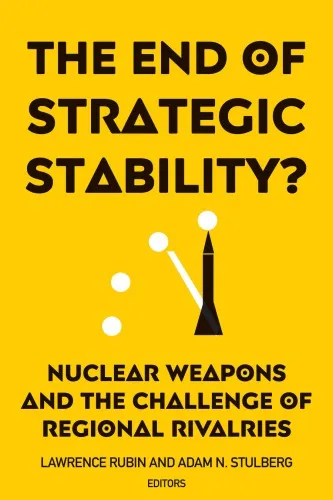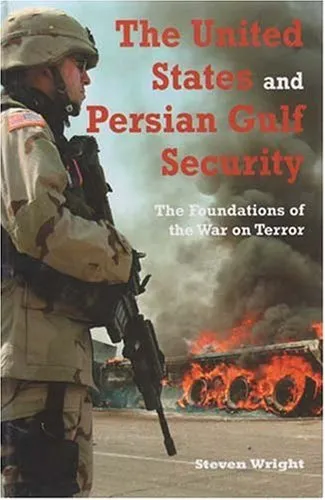The End of Strategic Stability? Nuclear Weapons and the Challenge of Regional Rivalries
4.5
Reviews from our users

You Can Ask your questions from this book's AI after Login
Each download or ask from book AI costs 2 points. To earn more free points, please visit the Points Guide Page and complete some valuable actions.Related Refrences:
Introduction to 'The End of Strategic Stability'
In a world that is constantly shifting due to political tensions, technological advancements, and fragile alliances, the concept of “strategic stability” is becoming harder to maintain. 'The End of Strategic Stability' explores this intricate web of global dynamics and analyzes how emerging powers, evolving doctrines, and the weaponization of information are dismantling the equilibrium that has defined international peace for decades.
This book is not merely a discussion of theoretical policies—it is a wake-up call and a deep dive into the tangible consequences of living in an increasingly destabilized world. It examines the foundations of strategic stability, how they have shifted over time, and why they now risk collapse under the weight of 21st-century challenges. By weaving together historical context, modern-day scenarios, and predictive analysis, the book offers an insightful and poignant look at what this new era of instability means for global security.
Built for policymakers, scholars, and engaged readers alike, 'The End of Strategic Stability' invites you to grapple with difficult questions: What happens when deterrence fails? How do nations respond when trust erodes within alliances? And most critically, how can the global community navigate this complex era of mounting unpredictability?
Detailed Summary of the Book
The book is divided into multiple chapters, each focusing on a specific aspect of strategic stability. Beginning with an introduction to the concept and its historical underpinnings, it provides a detailed account of how strategic stability emerged as a cornerstone of Cold War diplomacy. From the nuclear arms race to mutually assured destruction (MAD), the narrative sets the stage by explaining how nations historically maintained checks and balances to avoid catastrophic collisions.
As the chapters progress, the narrative shifts to the 21st century, where the traditional framework of strategic stability is strained by novel threats. The book discusses the role of emerging technologies such as Artificial Intelligence, cyber warfare, and autonomous weapons, which disrupt the balance established in the previous decades. Furthermore, its insightful analysis considers the complex interplay between geopolitical developments, the erosion of multilateral treaties, and the rise of revisionist powers. This combination of factors forms the heart of the book's argument: strategic stability, as the world knew it, has irrevocably changed.
The concluding chapters offer both a bleak warning and a cautious roadmap for the future. Recognizing the difficulty of restoring stability, the book urges nations to re-evaluate their policies and find a new paradigm—a path that prioritizes collective security and dynamic diplomacy over zero-sum games.
Key Takeaways
- The concept of strategic stability is no longer as effective in a multipolar and technologically driven world.
- Emerging technologies like Artificial Intelligence introduce new risks and change the calculus of deterrence and defense strategies.
- The weakening of multilateral frameworks, such as arms control treaties, has exacerbated global instabilities.
- Trust and cooperation among nations are critical to managing modern threats, yet they are at an all-time low.
- Without effective measures, the erosion of strategic stability could lead to unintended conflicts on a global scale.
Famous Quotes from the Book
"Strategic stability is not merely the absence of war; it is the presence of understanding."
"When nations invest more in creating chaos than in building trust, the end of stability becomes inevitable."
"The rules of 20th-century deterrence crumble under the weight of 21st-century innovation."
Why This Book Matters
The importance of 'The End of Strategic Stability' cannot be overstated in today’s landscape of uncertainty and geopolitical tension. As traditional power structures are challenged and innovative but potentially destabilizing technologies emerge, the need for informed decision-making is more critical than ever. This book matters because it offers an unflinching look at the collapse of old paradigms and the urgent need for a cooperative framework in the modern age.
By addressing the multifaceted nature of instability—technological, political, and social—the book equips readers with the tools to understand and navigate the complexities of global relations today. It serves as a clarion call for action and reflection, offering both a sobering analysis of current trends and a glimmer of hope for a more stable future.
Free Direct Download
You Can Download this book after Login
Accessing books through legal platforms and public libraries not only supports the rights of authors and publishers but also contributes to the sustainability of reading culture. Before downloading, please take a moment to consider these options.
Find this book on other platforms:
WorldCat helps you find books in libraries worldwide.
See ratings, reviews, and discussions on Goodreads.
Find and buy rare or used books on AbeBooks.
1271
بازدید4.5
امتیاز50
نظر98%
رضایتReviews:
4.5
Based on 0 users review
"کیفیت چاپ عالی بود، خیلی راضیام"



